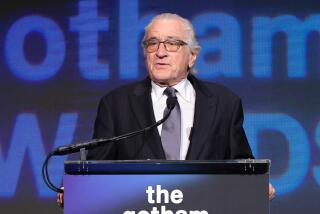Leadership Also Means Talking the Talk
- Share via
Someone should tell New York City Mayor Michael Bloomberg that it is a mistake to read famous speeches from history when called upon to commemorate contemporary events.
I learned this lesson from my mother on a far more trivial occasion, when I was 17 and setting out on my valedictory speech to the class of 1985 at the American School of The Hague. I didn’t want to write a speech; I wanted to “deliver” the one that thrilled me most, an address brought to my attention by my gifted history teacher, Jerry DeWitt.
The speech--Pericles’ funeral oration to the Athenians as recorded in Thucydides--seemed to me a better choice than adolescent ramblings on one chapter closing, another chapter opening, rites of passage, etc.
My mother reminded me, however, that that was what the occasion called for: a near-18-year-old sharing his vaguely expressed hopes and fears with other near-18-year-olds embarking on the same transition in life. A speech by a dead Greek on sacrifice, valor and the greatness of Athens would be out of place.
So I relented, giving instead a conventional speech that today I don’t remember, save that it quoted the great German soccer manager, Helmut Schoen, about facing life with “one eye laughing, the other eye crying.”
Now we as a nation are to observe on Sept. 11 ceremonies at ground zero in New York, where Bloomberg will recite Franklin D. Roosevelt’s “Four Freedoms,” New York Gov. George Pataki will read the Gettysburg Address and New Jersey Gov. James E. McGreevey will deliver excerpts from the Declaration of Independence.
As much as they might resonate on the occasion--Roosevelt with his lines about “freedom from fear,” Lincoln on the soil “we cannot dedicate, we cannot consecrate, we cannot hallow”--these texts were written for their times.
The events of 9/11 require a similar effort from our politicians, rhetorically challenged though they may believe themselves to be. Leadership is in words, not only deeds; our leaders will be failing us if they cannot summon up even a handful of sentences that have their own eloquence, even if not quite matching Lincoln’s. If Bloomberg and others speak their hearts and avoid sentimentality, bombast and bellicosity, they will be remembered generously for their effort.
That said, the mayor would do well to pick up Thucydides for the echoes he will find in New York and America today.
Alighting as he will on passages such as “our city is thrown open to the world,” “Athens is the school of Greece” and “in magnifying the city I have magnified” the dead, Bloomberg can gain inspiration, much as did Pericles himself, who begins by mentioning his reluctance to talk at all: “It is difficult to say neither too little nor too much; and even moderation is apt not to give the impression of truthfulness.”
Pericles feared--possibly with false modesty--that his eloquence was lacking and that consequently the reputations of the fallen would be at risk. This is a standard gambit of politicians (at Gettysburg, Lincoln said that “the world will little note nor long remember what we say here”) but a welcome one, coming as it does from a long rhetorical tradition in which the great and mighty behold themselves with humility before the truly awesome.
In the case of Sept. 11, that is a fitting fear, but one that must be overcome.
More to Read
Sign up for Essential California
The most important California stories and recommendations in your inbox every morning.
You may occasionally receive promotional content from the Los Angeles Times.













